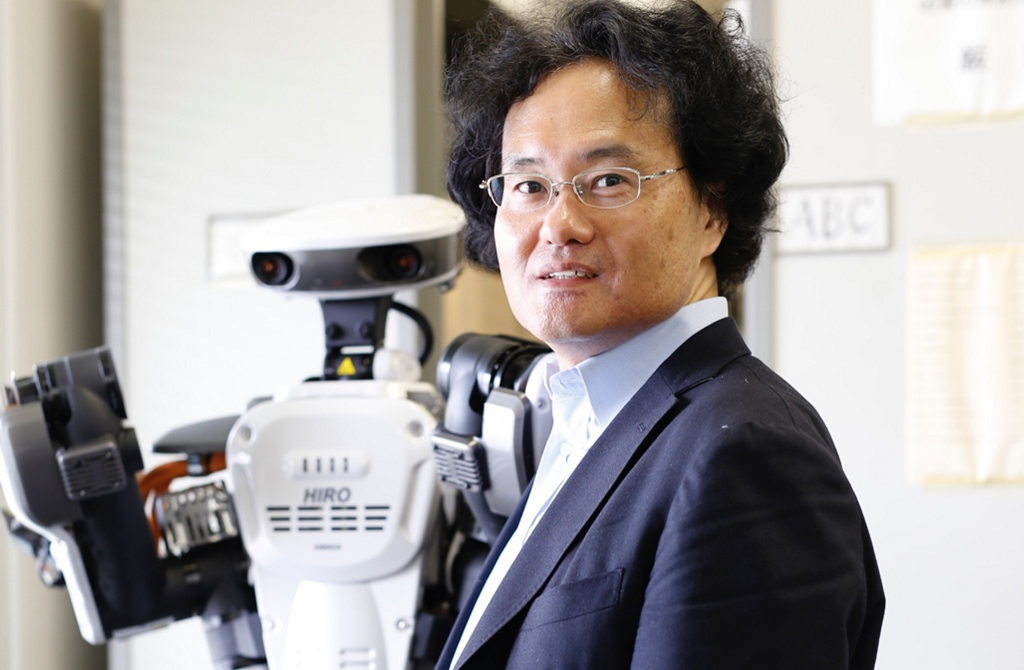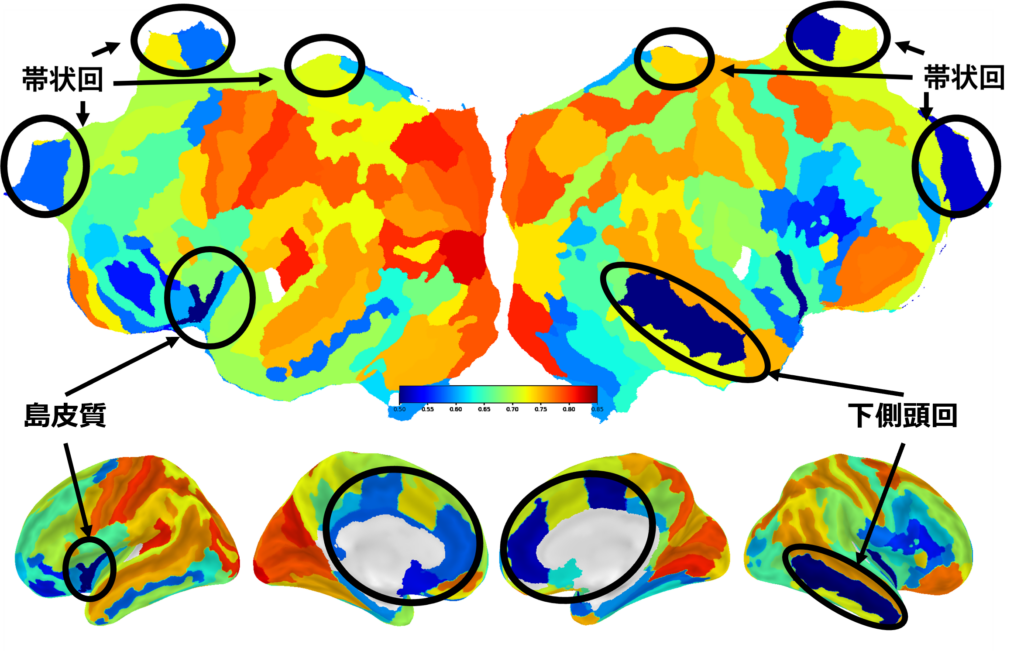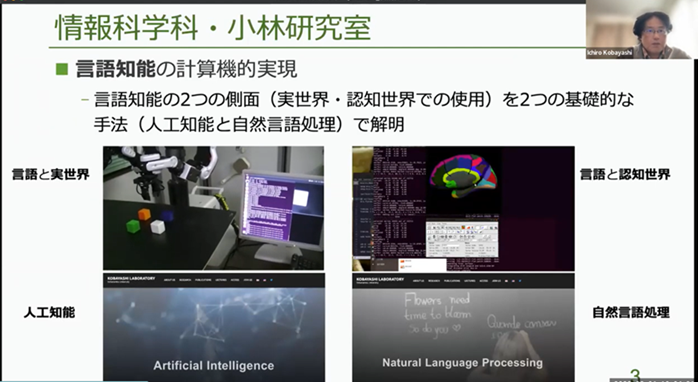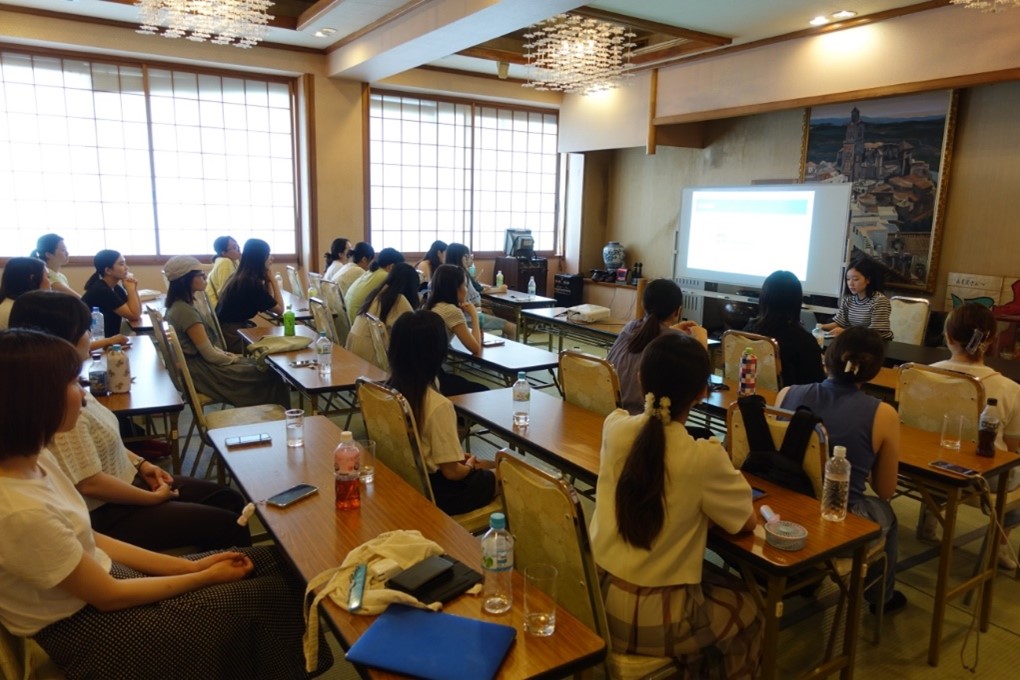
現在、取り組んでいる研究について教えてください。Could you please tell us about your current research work?
メインは、人工知能と自然言語処理の2つの専門を使って、対象となるシステムをより知的にする研究をしています。コンピューターのプログラム言語を人工言語といいますが、わたしたちが扱う言語は、自然に発生してきたという意味で「自然」言語と言っています。
現在は、大規模言語モデルをより発展させる手法に興味があって、時系列データなどの数値情報を言葉で表現することや、ロボットがどのように実世界の言葉を理解するかについて考えています。また、ヒトの頭のなかの情報処理にも興味があって、脳内情報解読手法の開発を進めています。
My main focus is on using two specialties in my research – artificial intelligence and natural language processing – to make targeted systems more intelligent. Computer programming languages are called artificial languages, while the languages that I research are “natural” languages in the sense that they originated naturally.
Currently, I am interested in methods to further develop large-scale language models; I am thinking about how numerical information such as time series data are expressed in words, and how robots understand real-world language. I am also interested in information processing in the human brain and am developing methods to decipher information in the brain.
多くのテーマに取り組んでいらっしゃるのですね。どのようにして、新しい発想が湧いてくるのでしょうか?
You are working on many topics, aren’t you? How do you come up with new ideas?
そうですね、学会で人と話したり、論文を読んだりすると、こういうものが必要だというアイデアや、こういうことをやってみたいという気持ちが湧いてきます。実は、修士課程の頃から一貫して「言葉」と「知能」に特化した研究を続けてきていますので、研究に対する考え方はずっと変わっていません。ですが、技術がどんどん発展するので、新しい技術を用いて自分の考えを表現する方法を考えていると、次々にテーマが湧いてきます。
つまり、日常生活のなかでインスピレーションが湧くというよりも、この分野の変化がすごく速いことのほうが影響していると思います。これまで自分が信じて積み重ねてきた知識や技術が、ある時に急にガラッと変わることもあります。今回も3回目の大きな技術革新*1によって紆余曲折がありました。
新しいテーマに挑戦するときは、知識を増やすだけでは足りなくて、それを「身につけた状態」にしていなければ、研究で還元することはできません。だから、それが出来ないと、この分野では淘汰されていってしまうといった気持ちで取り組んでいます。
Talking to people at conferences and reading papers gives me ideas about what we need, and I get a feeling about things that I would like to try. In fact, since the time of my master’s degree, I have consistently focused on “language” and “intelligence,” so my approach to research has always remained the same. However, as technology continues to develop, I find myself thinking of ways to express my ideas using new technologies, and topics keep coming up one after another.
In other words, I think it has more to do with the fact that things are changing so fast in this field rather than inspiration in my daily life. The knowledge and skills that you have accumulated and believed in can suddenly and unexpectedly change at a certain point. This time, too, there were twists and turns due to the third major era of technological innovation*1.
When taking on a new topic, it is not enough to simply increase your knowledge; you must have it in a “state of mastery” to be able to give back with your research. So, I work with the feeling that if I cannot do that, I will be eliminated in this field.

男女で相関が低くなった脳領域Brain regions with low correlation between men and women
ジェンダード・イノベーションの視点と先生のご専門との関係性を教えてください。What is the relationship between your perspective on gendered innovations and your specialty?
たまたま、脳神経科学の研究者と共同研究をした際に、ジェンダード・イノベーションに触れる機会がありました。その時に、男性と女性が脳内でどのように情報処理をしているのか、またそれらに違いがあるのかという研究が面白いのではないかと思いつきました。
世界的な動向では、脳の情報処理には「性差はない」という立場と、「性差はある」という立場の対極する論文が報告されていて、はっきりとはわかっていません。おそらく、「個人差」に埋もれてしまうことで、「性差」の結果が出にくくなっているのではないかと思います。ですから、今まさに、学生に性差と個人差の分析してもらっているところです。
I happened to be exposed to gendered innovations when I was doing joint research with a neuroscience researcher. It occurred to me then that it would be interesting to study how men and women process information in the brain and whether there are differences in these processes.
The global trend is not clear, with papers taking opposing stances, some claiming that there is “no gender-based difference” in brain information processing and others claiming the opposite. Perhaps, by being encapsulated in “individual differences”, the outcomes of “gender differences” are harder to find. Therefore, I am currently asking my students to analyze gender and individual differences.
具体的にはどのような分析をしていますか?
What specific analysis are you doing?
たとえば、博士課程の学生は、音楽を聴いたときの感情や情動について、男性と女性の頭の中でどのように処理されているのか、またその違いがあるのかに取り組んでいます。ほかにも、修士課程の学生には、短歌を読んだ時の男性と女性のグループで、処理の違いはあったのかという調査にチャレンジしてもらっています。
これらの結果の一部を2023年3月1日にIGIセミナーで報告しました。
For example, doctoral students are working on how men and women process emotions and feelings in their minds when they listen to music and whether there are differences between the two. Other master’s students are taking on the challenge of investigating whether there are differences in processing between male and female groups when reading tanka poetry.
Some of these results were reported at an IGI seminar on March 1, 2023.
IGIセミナーでは、音楽を聴いたときの脳活動の性差や個人差など、画像データを用いて多くの事例をご紹介いただいました。参加者の皆さまとも活発な議論があり大盛況でした。
2022年度第4回IGIセミナー報告はこちら
At the IGI seminar, many examples of gendered and individual differences in brain activity when listening to music were presented using image data. The event was a great success, with lively discussions among all participants.
The report presented at the 4th IGI seminar can be found here (in Japanese).

第4回IGIセミナー 小林研究室の紹介スライドThe 4th IGI Seminar-Introduction slide of Kobayashi Lab
「脳」の研究に取り組むことの面白さはどこにありますか?What do you find interesting about researching the brain?
実は、最初から「脳」の研究をしていたわけではないです。でも、思い返すと自分の興味が繋がってきたなかで「脳」の研究にたどりついたように思います。学生の頃は電気電子工学の研究室に所属していましたが、言語や哲学が好きで、シドニー大学の言語学科に留学したほどです。結局、哲学は難しすぎて、自分には無理だと思い、それなら言語を科学的に解明しようと考えました。つまり、哲学を知りながら、具体的に実世界で何をするのかを理系の視点から考えることが強みになると思ったわけです。
そういった経緯があり、学部での制御システムの研究から、大学院では知能システムの研究にシフトしました。そして、その時の指導教員が退職後に理化学研究所の脳総合研究センターに移ったのですが、そこで私の研究テーマをやるからと誘われたことが「脳」の研究につながることになりました。
脳の研究は、ちょうど1990年代の後半にものすごく注目され始めたんですね。例えば、人工知能を作りたいと思った時に、いまの最高峰の知能って、「脳」なんです。ですから、言語知能をやりたいと思ったときに、脳と同じような処理をする仕組みのコンピューターを作ろうっていうテーマになったわけです。その頃からですね。脳の研究を始めたのは。
Actually, I did not start out researching the brain. However, looking back, I think I came to brain research as my interests became interconnected. As a student, I was part of an electrical and electronic engineering lab, but I loved languages and philosophy so much that I studied abroad in the School of Languages and Cultures at the University of Sydney. In the end, I decided that philosophy was too difficult for me, so I decided to try to figure out language scientifically. In other words, I thought that my strength would be to use my knowledge of philosophy to think about what exactly we do in the real world from a science perspective.
With this background, I shifted from research on control systems in my undergraduate studies to research on intelligent systems in graduate school. Then, after my supervisor at that time retired, he moved to the RIKEN Center for Brain Science, and he invited me to work on my research topic there, which led to my research on the brain.
It was right in the late 1990s that brain research started getting tremendous attention. For example, if you want to create artificial intelligence, the highest level of intelligence today is the brain itself. Therefore, when I wanted to work on linguistic intelligence, I decided to build a computer with a mechanism that would process data in the same way as the brain. Since then, I began studying the brain.
言語や哲学は、高校生の頃からご興味があったのですか?
Have you been interested in languages and philosophy since high school?
本当は幼稚園の頃からロボットを作る研究者になりたいと思っていました。だけど、残念なことに、わたしが大学生のときにはロボットを研究する先生がいなかったんです。それで人工知能にドリフトしました。でも、実際は、ロボットを研究している人も、知能を研究している人も、お互いに融合したテーマをもっているんです。なぜなら、ロボットは体だけじゃなくて、知能が必要ですから。
そういった繋がりから、いま、ロボットの研究者たちと一緒に、ランゲージ・アンド・ロボティクス(言語とロボット)の研究会をやっています。そのメンバーで、2024年3月に言語処理学会第30回年次大会で「大規模言語モデルの実世界応用」というワークショップをしました。要するに、実世界の立場から「言語」を考えた時に、ロボットのような実態化している「体」がないと、言語の使用について考えることができません。一方、認知世界で、「言語の振る舞い」を考えるためには「脳」を見ないと解明できない。だから、言語と脳の2つのアプローチからロボットにかかわっています。
ちなみに、2つのアプローチというと、言語と脳が並行しているみたいなんですけど、真ん中に言語があるイメージです。実世界では、ロボットも言語を使わないとコミュニケーションがとれないので、人が言語をどうやって処理しているかを考えていかなければ全容は見えてこないということです。
I have actually wanted to be a robotics researcher since I was in kindergarten. Unfortunately, when I was a university student, there were no faculties who studied robotics science. So I drifted into artificial intelligence. But in reality, both those who investigate robots and those who investigate intelligence have topics that integrate with each other. Because a robot needs intelligence, not just a body.
Because of this connection, I am now working with robotics researchers in a research group on Language and Robotics. The members of this group gave a workshop on “Real-World Applications of Large-Scale Language Models” at the 30th Annual Conference of the Association for Natural Language Processing in March 2024. In short, when we think of “language” from a real-world standpoint, we cannot think about the use of language without a tangible “body” like a robot. On the other hand, in the cognitive world, we cannot understand “language behavior” without looking at the brain. So I am involved with robots from two approaches: language and the brain.
By the way, when I say two approaches, it is like language and brain are parallel, but I imagine language as being in the center. In the real world, robots also need to use language to communicate, which means that we need to consider how people process language to get the full picture.
研究活動の魅力を教えてください。What do you find appealing about your research work?
まず、誰も傷つけなくて済むっていうことが一番だと思っています。勉強や研究は、自分の興味を追究すればいいので、それによって誰かに迷惑をかけることなくできる。自分がそこの高みを目指すのであれば、それは自分で努力していけばいいだけの話なので。あと、「知る」という、知的な興味が何よりも報酬になっています。
また、この先に起こるかもしれない社会の変化や変革にかかわることができる魅力があります。例えば、いま、大規模言語モデルが話題になっていますが、あれは、情報科学の領域では大きなセンセーションでした。いわゆる隕石が降ってきたようなインパクトがあったんです。なぜなら、私の分野の研究者は、今までやっていた研究の方針を抜本的に変えなきゃいけなくなったためです。そういった背景もあり、大規模言語モデルの出現によって、一時的に研究が止まってしまった部分はありますが、それを乗り越えて、「次に何をするべきか」っていうのがじわじわ生まれてきて、それがきっかけとなって次のフェーズに移っていく。その繰り返しによって、パラダイムシフトが起こると思うんです。
ただし、社会が変わっていくときに、新しい発見や技術がどのように使われていくか、何が足りないのか、どのような技術を追加していく必要があるのか、という視点が問われます。
First of all, I think the best thing is that it doesn’t harm anyone. Study and research can be done without bothering anyone else by doing so, as long as you pursue your own interests. If you want to reach higher levels, it is just a matter of putting in the work yourself. And I think I find the intellectual interest of “knowing” to be more rewarding than anything else.
There is also the appeal of being involved in the social changes and transformations that may occur in the future. For example, large-scale language models are now a hot topic, and they’ve been a big sensation in the information science field. It’s had a meteoric impact. This is because researchers in my field have had to radically change the course of the research they have been doing. Against this background, the emergence of large-scale language models brought some research to a temporary halt. But after overcoming this, researchers gradually started thinking about what to do next, and this triggered a move to the next phase. I think the repetition of this process will bring about a paradigm shift.
However, as society changes, we must have a perspective on how new discoveries and technologies will be used, what is lacking, and what technologies need to be added.
パラダイムシフトと並行して、先生のご研究にもイノベーションが起きたということでしょうか。
Is it possible that in parallel with this paradigm shift, there has been an innovation in your research as well?
はい。もうイノベーションが起こっちゃったという感じです。でも、そういった社会の変化は、外から与えられるイノベーションなので、自分の研究を追い付かせながら新しい視点で進めていくことは簡単ではありません。
そういった意味では、同じ研究に取り組む仲間として、ゼミ生が研究テーマを選択するときには、ものすごく慎重に材料を提供しています。なぜなら、研究をするうえで、最初に何から始めるべきかを探すことはとても難しいですよね。例えば、4年生が初めて研究に取り組むときに、必要な情報を持っていなければ、自分がどのようなテーマに関心があるかは分かりません。ですから、最初の面談では、複数のテーマに関する最新情報を提供して、段階を追いながらいいテーマを見つけてもらえるように意識しています。
いま、30人の学生さんがいますが、一人ひとりが違うテーマを持っています。それらのテーマも多岐に渡っていて、学生さん同士でもお互いの研究がよくわからないことがあるみたいです。でも、逆にある意味、それはちょっとメリットだと思っています。1つのことしか勉強できないということではなく、違うテーマがたくさんあるから、ゼミに出れば「広く」知識を得られると思っているのですが…。
Yes. I feel like innovations have occurred. But these kinds of social changes are externally imposed innovations, so it can be difficult to keep up with one’s own research and move forward with new perspectives.
In this sense, as colleagues working on the same research, I carefully provide material for seminar students when they choose their research topics. This is important because it is very difficult to know where to start when doing research. For example, a fourth-grade student working on research for the first time will not know what topics interest them, if they do not have the necessary information. Therefore, in the initial interview, I am conscious of providing up-to-date information on multiple topics so that they can find a good topic by going through things step-by-step.
I now have 30 students, and each one has a different topic. Those topics are also very diverse, to the extent that it seems that sometimes students don’t understand each other’s research that well. But actually, I think that’s kind of an advantage. It means that, rather than only being able to study one thing, students are exposed to many different topics, so they can gain a breadth of knowledge by attending seminars.
目まぐるしく変わる時代ですので、いろいろな知識や視点をもって社会に出ることは、とても魅力があるように思います。
In these fast-paced times, one of the things that appeals about studying in this way is that students go out into the society with a variety of knowledge and perspectives.
そういえば、博士課程を修了した学生さんから、「社会人になって、周りの人から「あなたは、いろいろなことを知っていますね」と言われることが多く、それがうちのゼミの特性じゃないか」と言ってもらったことがあります。
まあ、ゼミ生が多いと、その数だけ新しいことを考える必要があるので、たまに苦しく感じる時もあります(笑)。ただ、1回テーマを決めると、そこから先は、自立して取り組んでくれるので、全員の指導ができているのは、学生さんのおかげだと思います。
By the way, I was once told by a student who had acquired the doctoral degree, “When I entered the workforce, people around me would tell me that I knew so many things. I think that’s a characteristic of our seminar.”
Well, when I have a lot of seminar students, I have to come up with new ideas for each of them, so it can sometimes feel stressful (laughs). However, once they’ve decided on a topic, from that point forward, the students work on it independently, so I’ve got to give the students credit.
ゼミ生のつながりを深められる機会はありますか?
Are there opportunities for seminar students to network with each other?
去年から遠足を始めました。遠足は日帰りですが、例年、1泊2日の合宿もしています。合宿では、初日に研究着手報告会といって、新たにゼミ生として所属した4年生に、先輩たちの前で研究のお披露目をしてもらいます。もちろん、学生によって進捗に幅がありますが、自分で責任を持って最後まで発表してもらいます。
Last year we started going on field trips. The field trips don’t involve an overnight stay, but we also have an overnight camp every year. On the first day of the camp, we hold an initial research report meeting where we ask the fourth-year students who have newly joined the seminar to present their research in front of their seniors. Of course, there is a wide range of progress from student to student, but they are responsible for their own presentation to the end.
ゼミではどのようなことをしているのですか?
What do students do in the seminar?
まず、文献講読で、自分が読んできた論文を紹介します。そのあと、報告担当者が自分の研究の進捗を報告します。4年生は、大学院生の研究を聞いてもよく分からないかもしれませんが、「耳慣れる」ことが大切だと思っています。先輩たちは後輩の発表を聞いて、コメントや情報提供をしているので、そこで縦の関係もちゃんと作れているんじゃないかと思っています。
First, students read the literature and discuss the papers they have read. The person in charge of the report will then report on the progress of their research. Fourth-grade students may not be familiar with the research of graduate students, but I believe it is important for them to get used to hearing about it. The seniors listen to the presentations of the juniors and provide comments and information, so I think that this is where vertical relationships get properly built.
「耳慣れる」って大切ですね。
“Getting used to hearing” about research is important, isn’t it?
大切です。全然分からなくても、1年間聞いてれば、さすがにいろいろと考えて話せるようになります。ゼミは週に2回やっていて、ほかにも先輩が後輩に深層学習(ディープラーニング)を教える機会を設けています。教えることは学ぶことですし、教える責任感から自然に勉強するようになります。また、「教えられる側」の後輩も、教えてもらう経験で先輩への感謝や尊敬の気持ちを持つようになり、「教える側」になるための心構えもできます。でも、実は、そういった仕組みがちゃんとまわるようになったのはごく最近なんです。学生さんには、いろいろな知識に触れることを含めて多くの経験をして欲しいです。
It is important. Even if initially doesn’t understand at all, after a year of listening, they will naturally be able to think and talk about many things. The seminar is held twice a week, and other opportunities are provided for seniors to teach deep learning to their juniors. Teaching is learning, and the sense of responsibility that comes with teaching naturally leads to learning. The juniors who are being taught will also come to appreciate and respect their seniors through the experience of being taught, which also prepares them for teaching later. But this kind of system has actually only been put in place recently. I want students to have many experiences, including exposure to different kinds of knowledge.

研究室合宿(2024年8月@伊東)での報告会の様子Debriefing session at the Training camp (August 2024 in Ito, Japan)
最後にジェンダード・イノベーション研究に興味を持った方、これから取り組もうとしている方へのメッセージをお願いします。Finally, do you have a message for those who are interested in gendered innovations research or who are planning to work on it?
男性と女性って違いがあると思うんですよね。ただし、違いはあるけど、その違いが何かという部分は、はっきり分かってないところがあって。例えば「知能」を考えた時に、男性の知能と女性の知能があるのか否かもまったく分かってないですし、他にもまだまだたくさん分かってないところがあります。
ですから、男女の違いが分かることによって、きっと、もっとお互いがよく理解し合うことができて、幸せな社会が築けるんじゃないかなっていうふうに思っています。多くの人に、ぜひ、性差について興味を持って、研究を通じてお互いを尊重する気持ちを持ってもらいたいと思います。
I think there are differences between men and women. However, while there are differences, we are not quite sure what those differences are. For example, when we consider “intelligence,” we don’t even know if there is male intelligence or female intelligence at all, and there are many other things we still don’t know.
Therefore, I believe that by understanding the differences between men and women, we can surely understand each other better and build a happier society. I hope that many people will become interested in gender differences and develop mutual respect through the research.
新しいことを学ぶ楽しさに加えて、イノベーションを起こすプロセスや研究姿勢など、社会が大きく変わるときの指針となるようなお話をありがとうございました。
小林先生のご研究に興味をお持ちの方は、ぜひIGIウェブサイトをご覧ください。(小林先生の研究紹介はこちら)
Thank you for your talk on the joy of learning new things, as well as the process of innovation and your approach to research, which will serve as a guide for a time of major social change.
The introduction to Professor Kobayashi’s researches is click here.


